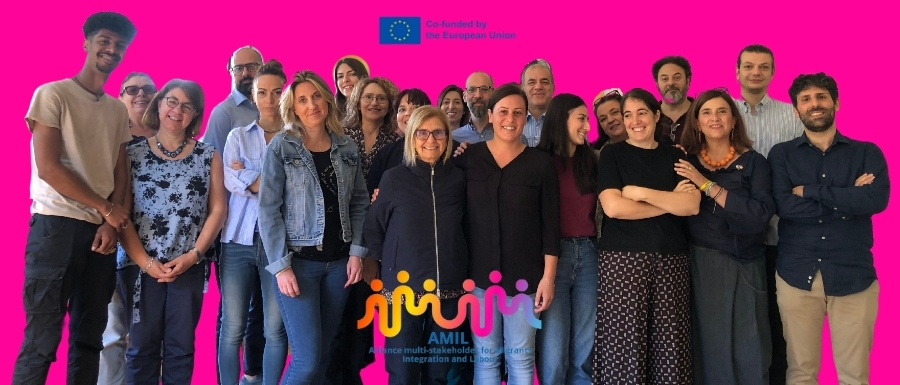AMIL – Alliance Multi-Stakeholders for Migrants Integration and Labour aims to promote the sustainable integration of third-country nationals into the labor market by extending and strengthening the MEIC methodology. This innovative approach, based on collaboration among multiple stakeholders, enables migrants to take an active role in their integration process through personalised orientation and training programs.
Coordinated by CIES Onlus, the project includes partners such as Programma Integra, CGIL Roma e Lazio, ALDA, CODECA, PwC, and Speha Fresia, with support from associated partners Roma Capitale and SEVE.
In the spirit of transparency and fostering ongoing dialogue between partners and the public, each month one of the organisations involved in the AMIL project – Alliance Multi-Stakeholders for Migrants Integration and Labour – will provide updates on the project’s goals, activities, and progress. This month, ALDA is pleased to share insights from Speha Fresia, project partner, an Italian cooperative that has been active since 1983 in the fields of employment services, professional training, consultancy, and transnational network development.
At the heart of the AMIL project is a person-centered approach to socio-educational and employment services. Drawing on the expertise of its partners, the project unfolds through a comprehensive and collaborative plan to be implemented over the next 20 months. This approach aims to address various challenges and explore innovative solutions, benefiting not only local experiences but also shared knowledge among European partners in Greece, Cyprus, and France.
Who is the AMIL project supporting?
The primary beneficiaries of the project are young adults (18-29 years old) from third countries, including refugees, asylum seekers, and those benefiting from subsidiary protection. The program focuses particularly on women. Each participant embarks on a personalised path that begins with tailored guidance and continues through teamwork toward specific operational phases. The ultimate goal is sustainable job placement within the limits of available resources.
Navigating Complex Contexts
The AMIL project operates in diverse and sometimes challenging contexts. Speha Fresia follows the MEIC (Migrants’ Economic Integration Cluster) methodology to create dedicated local networks, addressing social disadvantages while focusing on employment outcomes for the beneficiaries. The choice of regions and sectors is critical, as it directly influences the success of the program.
In Italy, services are largely centralised in Rome for accessibility, while engagement with companies targets sectors with significant demand for workers. By aligning training programs with qualification standards equivalent to EQF2 or EQF3, the project ensures that participants are equipped with the skills needed for the labor market.
As part of its role in the project, Speha Fresia will conduct research and analysis of the labor market and establish a database of “inclusive companies” in the Lazio region. This data will support the identification and guidance of participants, while also helping to create clusters of organisations involved in migrant inclusion, in collaboration with partners like CIES and CGIL Roma e Lazio.
Addressing these objectives in a coherent, standardised manner, given the limited time and resources, is one of the project’s key challenges. Speha Fresia and other partners are tackling this through regular coordination meetings and thorough planning. The project is already targeting entrepreneurial sectors with hard-to-find profiles and offering a composite training proposal. There is even the potential to introduce new professional qualifications to the Lazio Region’s Repertoire.
Activities led by Speha Fresia include:
- Sector-specific lessons tailored to areas of interest
- Lessons on the green economy, focusing on agri-food and waste management
- Training in key sectors such as:
- Catering services
- Construction
- Logistics
- Cleaning services
- Trade
- Certification for prior learning
The main challenge remains: providing concrete, meaningful, and sustainable solutions for the social and labor integration of the 50 young beneficiaries.
